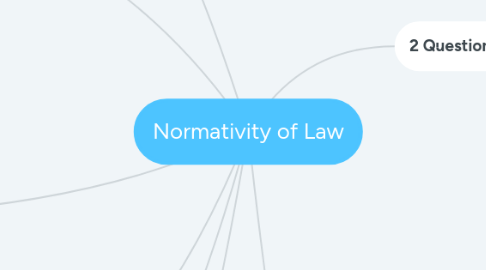
1. Definition
1.1. General directions counting in deliberations about what to do
1.2. Ought to/ Should
2. Metaethics
2.1. Positive Morality
2.1.1. Norms that are actually used
2.1.2. Varies with time and place
2.2. Critical Morality
2.2.1. Justified Morality
2.2.2. Critically Assesses Norms/ Beliefs
3. Return to Positivism
3.1. Austin
3.1.1. Legal Duty correlates to sanction
3.1.2. Sanction Motivates
3.2. Hart
3.2.1. Difference between being obliged and having an obligation (legal obligation)
3.3. Kelsen
3.3.1. Ought but not connected to reality
3.4. Raz
3.4.1. Committed Statements
3.4.2. Detached Statements
3.4.3. Exclusionary Statements
3.4.3.1. People assume Legislator had legitimate reasons
4. Law and Practical Reasoning
4.1. Individualistic
4.1.1. Should I eat salad?
4.2. Collectivist
4.2.1. Legal
4.2.1.1. Should I drive faster?
4.2.2. Moral
4.2.2.1. Should I donate?
5. Why obey the law
5.1. Natural law, good reasons
5.1.1. Prima Facie duty
5.1.1.1. 1. Gratitude
5.1.1.2. 2. Consent
5.1.1.3. 3. Fairness
5.1.1.4. 4. Common good
5.2. Positive law, no statement
6. Limits of Positive Law
6.1. 1. Inherent in Natural Law
6.2. 2. Law limits freedom
6.2.1. Positive: Ideal of the truly free might require coercion
6.2.2. Negative: Freedom from restraint
7. Natural Law
7.1. Law is not only social facts
7.2. Answers "What should we do?" independently of what people do/ think
8. 2 Questions
8.1. What are proper (good) laws?
8.1.1. Aquinas
8.1.1.1. Four types of law
8.1.1.1.1. 1. Eternal Law
8.1.1.1.2. 2. Divine Law
8.1.1.1.3. 3. Natural Law
8.1.1.1.4. 4. Positive Law
8.1.2. Finnis
8.1.2.1. Human Flourishing
8.1.2.1.1. Examples
8.1.2.1.2. Achieve through
8.1.2.2. Natural Law
8.1.2.2.1. Has human flourishing as its purpose
8.1.2.2.2. Get to it through universal and unchangeable principles of natural law
8.2. How do you make laws properly (well)?
8.2.1. Fuller
8.2.1.1. Law is a purposive enterprise, to fulfill that purpose, laws need to be good.
8.2.1.2. Inner Morality Principles
8.2.1.2.1. 1. Generality
8.2.1.2.2. 2. Promulgation
8.2.1.2.3. 3. Non-retroactivity
8.2.1.2.4. 4. Clarity
8.2.1.2.5. 5. Non-contradiction
8.2.1.2.6. 6. Possibility of compliance
8.2.1.2.7. 7. Constancy through time
8.2.1.2.8. 8. Congruence between official action and declared rule

